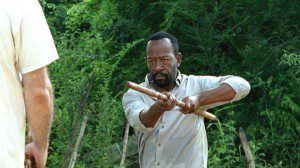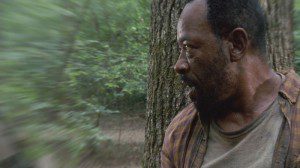
The Walking Dead has always been more about the good and evil inside the living than the horror of zombies. Sure, while every survivor in AMC’s hit show must battle and terminate his share of Walkers, the real tension we find in this weekly splatterfest is in the hearts, minds and souls of those survivors. What they must do, and what black deeds they feel they have to commit, to survive.
This can make for a pretty bleak hour of television at times. So many would-be heroes eventually succumb to either the zombie horde or, worse yet, relativistic pragmatism.
Maybe that’s why I find Morgan Jones so compelling.
In Sunday’s episode, “Here’s Not Here,” Morgan (played by Lennie James) undergoes a remarkable mental, emotional and (I think especially) spiritual transformation.
When the flashback episode opens, we see the Morgan viewers met in Season Three: an utterly unhinged psychopath. He lives for just one thing: To kill. Zombies, people, it doesn’t matter. He’s less a man than a monster—an angel of death in a world already filled with it.
But then he happens upon a strangely idyllic cabin in the woods, a goat gently bleating in the front yard. He tries to take the goat, but a voice from an unseen man warns him not to. “Why don’t you put the gun down and we’ll talk,” the voice says. “Have some falafel?”
Morgan is in no state of mind to talk. But the man—Eastman—is insistent, especially since it’s clear Morgan’s not going to leave until he does a little killing. The cabin’s owner wallops Morgan on the head a couple of times (apologizing as he does so) and, when Morgan wakes up, he finds himself in, essentially, a prison cell mysteriously placed in the middle of Eastman’s cabin.
“What’s your name?” Eastman (John Carroll Lynch) asks.
“Kill me!” Morgan pleads.
“That’s a stupid name.”
We learn that Eastman practices Aikido, an Eastern martial art that is, unintuitively, predicated on the welfare of your opponent. Practitioners like Eastman try to redirect the energy of the attacker while not really harming them. It’s about subduing your adversary, not hurting them. “You have to believe that life is precious,” Eastman says. “That all life is precious.” He gives Morgan a book called The Art of Peace by Morihei Ueshiba.
Aikido is obviously steeped in Eastern spirituality. One site calls it the “quintessential martial art form of Buddhism,” a religion predicated on respect for all living things. But the episode feels like it has some Christian undertones, too—or, at least, elements that would resonate with Christians.
Coming In Death
When Morgan comes into Eastman’s house, he’s literally insane with grief and rage. “anything that gets anywhere near me, I kill ’em,” he tells Eastman.
“Why?”
“Because that’s why I’m still here,” Morgan says.

He lost his wife and his son to the zombies. His world is filled with death. He, like so many others in The Walking Dead, cannot discern a purpose behind the apocalypse or why he survived while so many have not. But we all, in the end, need purpose. And Morgan thinks he’s found his in rabid nihilism.
Eastman (whose name, not-so-coincidentally, I’d imagine, holds echoes of dawn and the rising sun) refuses to accept that’s who Morgan is. As a former psychologist, he knows that most people aren’t evil, but broken. And he means to help Morgan be whole again, if he can.
It’s not an easy process, as you can imagine. When Eastman tells him that his cell door is unlocked—that it’s actually been unlocked the whole time—Morgan throws himself at Eastman, still intending to murder the man. When Eastman’s Aikido skills prove too much for Morgan to overcome, he again asks to die. And when Eastman refuses to do that, either, Morgan slinks back to the cell and slams the door shut. It’s almost an acknowledgement of Morgan of how bad he is. How many bad things he’s done. That he deserves to be locked up—even if there isn’t even a key.
That’s a pretty resonant moment for me—Morgan sulking in a locked cell. It’s the ultimate metaphor of what life is like before we find Christianity. We lock ourselves in our own cells—punishing ourselves for our sins, trapped in our own anger and shame. We cannot conceive that it would be so easy to be free … to simply open the door that Jesus has given us. So we sit.
Finding New Life
Eventually, of course, Morgan does leave the cell. He becomes a disciple of sorts—practicing with Eastman, slowly absorbing his philosophy.
“What’s done is done,” Morgan echoes Eastman, suggesting that it’s possible to move past your past. Yes, both have done some terrible things: We learn that in certain terms. But the slate can be wiped clean. There can be forgiveness. There can be hope—even in a world as hopeless as this one.
It’s still not easy even then. And when Morgan is confronted with, quite literally, a past misdeed—the zombie of a kid whom Morgan killed in the beginning of the episode—Eastman pushes Morgan out of the way, suffering a mortal wound in the process. He sacrificed his life for the life—and really, the salvation—of a man who tried to kill him multiple times.
Eastman saved Morgan, both body and soul.
Alas, in AMC’s nightmare world, no soul is ever truly safe. The Walking Dead doesn’t cotton much to grace, and even at the end of the episode you could see Morgan’s pacifism challenged by a Wolf—a member of a clan of survivors that aims to exterminate all life. If Morgan was pushed to nihilism through tragedy, the Wolves practice it as a philosophy. And we wonder whether Morgan can stay true to his pacifistic principles in the face of such evil.
But I have hopes that Morgan will. It’s hard to hold to the principle of something greater, something higher in a world like we see in The Walking Dead—which perhaps is all the more reason to hold it.












